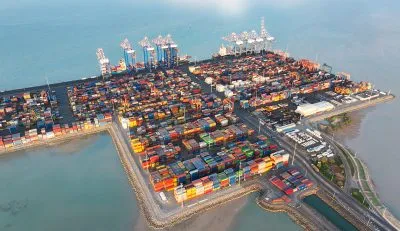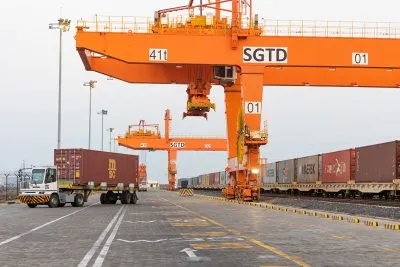Located at the confluence of Africa, the Middle East, and Asia, Djibouti’s ports complex is a hive of constant activity. The ecosystem, made up of the Port of Djibouti, the Doraleh Multipurpose Port as well as specialised ports such as Tadjoura and Ghoubet, underpins the country’s role as a regional logistics hub and attracts significant investment in infrastructure.
Robleh Mohamed Barreh, CEO of Oriental African Logistics and head of the Association of Djiboutian Freight Forwarders (one of the two industry associations for freight forwarders), says there are 126 freight forwarders operating in the country. “It’s very competitive for such a small country,” he concedes. However, the freight forwarders are not exactly struggling for business. The vast bulk of neighbouring Ethiopia’s external trade currently transits through Djibouti. “Ethiopia is a country that depends heavily on exports for foreign currency.
Exports are very crucial for them and 90% of their exports go through Djibouti,” Barreh explains. The figure for Ethiopia’s transit imports is not far off that.
The arrangement works well for both parties. Despite signalling intentions to find other ports for its shipments, Ethiopia continues to rely on Djibouti. The reason is that Djibouti is competitive and reliable, says Barreh. “Freight forwarders understand their needs; and the ports are very efficient. Of course, there are things that need to be improved too, such as the infrastructure. But we will get there,” he says.
Some of those improvements have already taken place. Over the last decade the government of Djibouti has made or facilitated significant investments into the ports as part of its Vision 2035, which aims to transition the nation into a middle-income economy by enhancing its role as a regional logistics and trade hub.
Seamless online operations
It has also invested in digitalisation, spurred in part by the pandemic. The Djibouti Port Community Systems (DPCS) portal was set up to digitalise, streamline and simplify the different processes linked to importing and exporting through the ports, airports, rail and road links. The Sydonia World system is a single-window system that handles all customs-related issues.
Container throughput has surged
In the past, Barreh says, freight forwarders had to manually track their containers within the port and physically go to container terminals with pro-forma invoices. “For us, it’s been a generational shift. Today, lorries come in, load up, and the process is entirely seamless.”
As a result, container throughput has surged from 600,000 to 700,000 units to 1.2m containers this year, effectively doubling within the past three to four years.
This growth has not come from a dramatic increase in Ethiopian traffic. “It’s primarily about gaining market share from other ports,” Barreh explains. “Imports into Ethiopia haven’t significantly increased, but we have attracted more cargo from ports that either lack similar services or have chosen Djibouti for its security advantages.”
Taken together these improvements have made Djibouti a compelling proposition for exporters and importers in the region. “The best place to assess customs efficiency is at the borders, and today a lorry spends no more than 25 minutes crossing between Ethiopia and Djibouti,” he says.
Fluid operations
“This highlights the fluidity of our border operations, where customs documents are well understood and integrated on both sides.” As Ethiopia and Djibouti move towards implementing a unified customs system, Barreh expects that procedures will be streamlined even further.
Having a Djibouti Port Community Systems office in Ethiopia is also a plus, Barreh thinks.
“We know that the customs authority is investing in a container tracking project that will enable goods to be tracked to their final destination. This initiative will significantly enhance transparency and build trust with customers, primarily in Ethiopia.”
One of the biggest headaches for customers, he says, is when goods go “dark” and it is not clear what actions have been taken by freight forwarders, the port, or customs, when delays occur. The new tracking system will eliminate this uncertainty.
Ultimately, Barreh says, the more transparent the process becomes, the more efficient, fluid and competitive the logistics chain will be. Further improvements are expected.
“We want to have a ‘paperless’ system, where there is no more paperwork or where QR codes are used to pass customs barriers or to pass port barriers right up to the border. We hope that we will be able to keep up this pace.”
Bigger share of the market
Barreh says that Djiboutian transporters also want a greater share of the cargo market; Ethiopian carriers currently handle 97% of the freight, leaving only 3% for Djiboutian companies.
“It’s the customers in Addis Ababa or in Ethiopia in general who decide; some are large industries that invest in their own trucks and transport logistics to avoid delays,” he says, adding “we want to accelerate, we want to invest, and we want a greater share of the market.”
One way this might happen would be for the parties in the market to join forces so that they have more power and bigger voices. Barreh expects there will be some consolidation, not just of companies, but of the trade bodies themselves.
“We had a meeting with the chair of the ports and we are looking at merging ATD and the other body, the RTA, to form a single association.
“In the coming years, I believe freight forwarders will evolve into full-fledged logistics companies, not just handling customs clearance and truck loading, but also offering door-to-door services.
“This would involve transporting goods directly via Djibouti, taking responsibility for both the shipment’s port of departure and final delivery, potentially even controlling part of the transport and freight chain.”
Want to continue reading? Subscribe today.
You've read all your free articles for this month! Subscribe now to enjoy full access to our content.
Digital Monthly
£8.00 / month
Receive full unlimited access to our articles, opinions, podcasts and more.
Digital Yearly
£70.00 / year
Our best value offer - save £26 and gain access to all of our digital content for an entire year!

 Sign in with Google
Sign in with Google 



